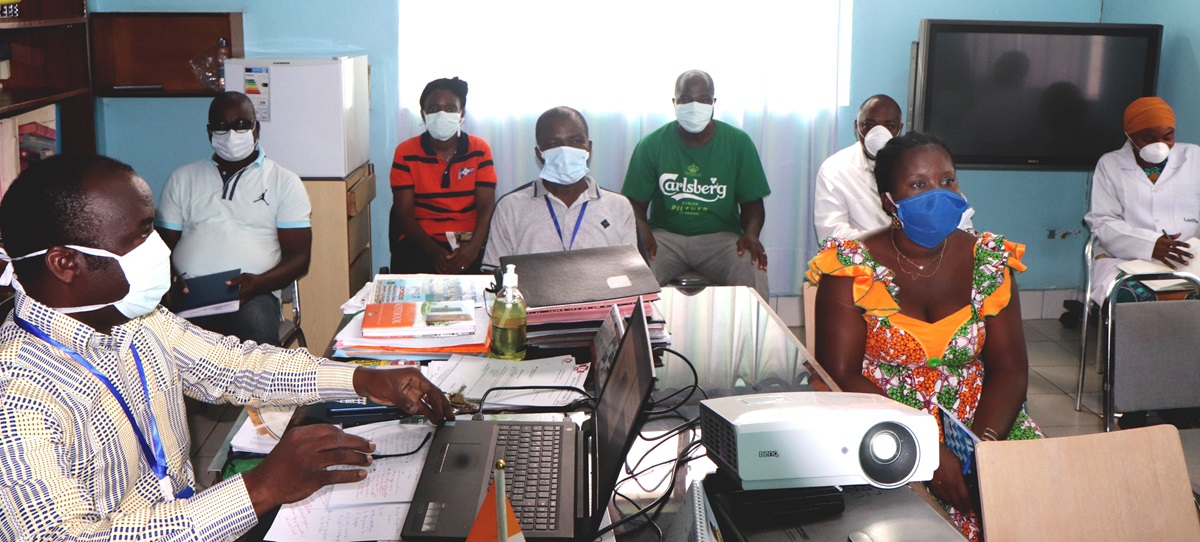United Methodist hospitals in Africa and the Philippines are racing to prepare their facilities to identify and treat patients with COVID-19.
While most United Methodist medical centers in Africa have yet to encounter patients with the coronavirus, preparation is underway for eventually treating such cases, even though most lack ventilators and other crucial equipment. The World Health Organization reports that there are fewer than 2,000 working ventilators available across the continent, with 10 countries having none at all, according to The New York Times.
There have been more than 22,000 confirmed cases of coronavirus in Africa and more than 1,000 deaths, according to data from the Africa Centers for Disease Control and Prevention.
At Old Mutare Mission Hospital in Mutare, Zimbabwe, administrator Monica Nzarayebani said possible isolation wards for COVID-19 cases are being set up. There have been 25 confirmed cases in the country and three deaths.
“We have identified four rooms in the building that were previously used as the waiting mothers’ shelter, which need to be renovated and furnished to cater for coronavirus patients,” she said, adding that the hospital needs a tent where screening and testing can be conducted.
Africa University producing hand sanitizer
Under the Zimbabwe Business Fighting COVID-19 Initiative, Old Mutual provided about $10,000 USD for AU to produce affordable hand sanitizers.
“As a university, we believe that stopping one infection today will prevent several times as many infections in the future. The grant has therefore come at an important time when Africa University is scaling up its efforts to develop products that assist in preventing the spread of COVID-19,” said AU vice-chancellor Munashe Furusa.
“This particular donation will support the mass production of the hand sanitizers by the Africa University research teams,” he said.
Production began on April 13 and the university is producing 500 liters a day in 50-, 100- and 500-milliliter bottles.
RELATED: AU shifts to online classes
Nzarayebani said the hospital, which is adjacent to Africa University, has prepared an inventory and identified immediate needs such as additional staff members for the new isolation unit and equipment including eight ventilators, infrared thermometers, oxygen tanks and personal protective equipment.
“We have not had any COVID-19 cases at Old Mutare but some patients have panicked when presenting with respiratory conditions, which we later discovered were not the coronavirus,” she said. “(The hospital) is at high risk due to the socioeconomic status of the people in the catchment area as the majority of the population is from surrounding farms and is nomadic.”
Administrator Gashirai Chikonyora said United Methodist Nyadire Mission Hospital has identified an isolation area and is conducting an awareness campaign for staff and the community.
Like Old Mutare, the hospital has no ventilators and will refer critically ill patients, Chikonyora said.
Mutambara Mission Hospital has two isolation units identified and staff has received training from the facility’s infection control nurse. However, the hospital does not have ventilators, testing kits or personal protective equipment.
“We have not had any COVID-19 cases, but if we do have critical cases, we will refer them to Mutare Infectious Diseases Hospital,” said admitting nurse Nhamo Mirato.
The challenges facing church hospitals are similar across the African continent.
“In Kenya, our greatest challenge currently is acquiring the desperately needed ventilators. Trinity Methodist dispensary does not have a single ventilator. We also don't have personal protective equipment,” said the Rev. Josam Kariuki, Central District superintendent.
“We have enough rooms which can be converted to intensive care units. At the moment, we are referring patients to the government facility … 95 miles away,” Kariuki said.
The lack of ventilators and personal protective equipment is a major setback for Kopanga Methodist Medical Center, which serves a population of over 10,000 people.
Alice Wasilwa, a registered nurse and clinic manager at that the Kenya facility located near the border with Tanzania, said center serves a population of over 10,000 people.
“We’ve run out of masks and sanitizers due to the large numbers of patients from across the border in Tanzania,” she said. “For health care workers at the front line of the COVID-19 pandemic, work has suddenly become a frightening place. One of our nurses left us citing possible risks of contracting coronavirus.”
There have been 281 confirmed coronavirus cases and 14 deaths in Kenya and 170 cases and seven deaths in Tanzania.
Moheto United Methodist Clinic in Kenya has been educating people in Migori County on personal hygiene. “Other than medication and test kits for COVID-19, my community is in need of relief food,” said the Rev. Kennedy Mwita, senior pastor at Moheto United Methodist Church. “Most villagers are small-scale traders who are on compulsory lockdown that has adversely affected their daily income.”
The Rev. Wilton T. Odongo, conference secretary to the East Africa Episcopal Area and Nairobi District superintendent, said it is the church’s responsibility to reach out to the vulnerable. “Every need in the world is an open door to share God's love. That's why, as a church family, we are responding to the COVID-19 crisis, not by panicking or hiding out of fear, but by serving the people who are most vulnerable,” he said.
In Côte d'Ivoire, Dabou United Methodist Hospital is taking steps to prepare for infected patients, despite the lack of equipment for their care.
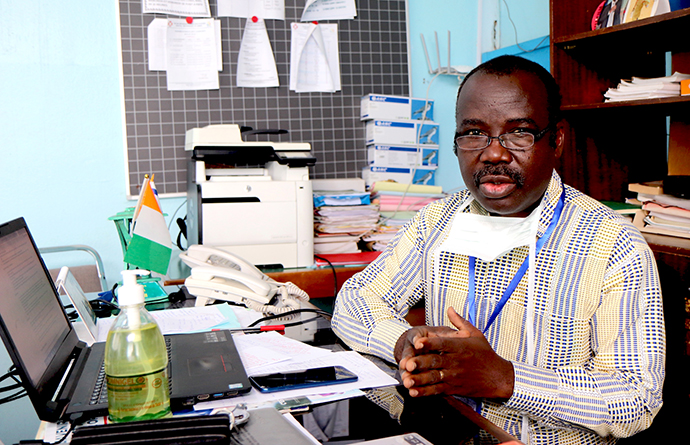
Dabou has no confirmed cases of the coronavirus yet. However, staff at the United Methodist hospital is not ruling out the possibility because of Dabou's proximity to Abidjan (about 25 miles away) and the large number of workers and travelers who commute between the two cities every day.
“We are preparing in one way or another to face this pandemic,” says Dr. Daniel Ahui, a specialist in infectious and tropical diseases and director of the hospital.
Preventive measures include hand-washing stations in all hospital corridors, distribution of masks and gloves to all staff, maintaining social distances and training staff.
Twice a week, Ahui brings the staff of each department together for an hour to prepare them for how to deal with suspected or confirmed cases.
“If developed countries, with their technical platforms, have not been spared by the health crisis, what will happen to our underdeveloped countries? Our salvation can only come from prevention,” he said.
The hospital has applied for a $10,000 solidarity grant from the United Methodist Board of Global Ministries to extend training to religious and community leaders.
As a referral hospital, the United Methodist Hospital in Dabou has been identified to work with the city’s general hospital to receive confirmed cases.
“We have identified a room that can accommodate two or three beds for isolation cases,” Ahui said. However, this room has yet to be prepared and equipped.
Even though the 120-bed hospital has the necessary infrastructure, Ahui said he regrets the lack of equipment. “We are not ready … If we are not equipped, we won't be able to provide treatment. We will have to evacuate the sick,” he said.
In the Democratic Republic of Congo, where there have been more than 300 confirmed coronavirus cases and 25 deaths, United Methodist medical facilities are preparing to battle the pandemic. Most lack ventilators, no-contact thermometers and other materials necessary for the management of the coronavirus cases.
“At present, we are concerned with training the nursing staff of our health facilities so that they know how to be careful in the face of possible cases,” said Gabriel Dikete, coordinator of the health department. “The coronavirus crisis could be difficult to control in the DRC given its demography … public hospitals may be overwhelmed and infected people would then resort to our hospitals for treatment,” he said.
In the Congo East Episcopal Area, Dr. Damas Lushima, health coordinator for the church, said that some United Methodist hospitals are using materials obtained to fight the current Ebola outbreak to battle COVID-19. Days before WHO was expected to declare an end to the second deadliest Ebola outbreak in history, five new cases were reported.
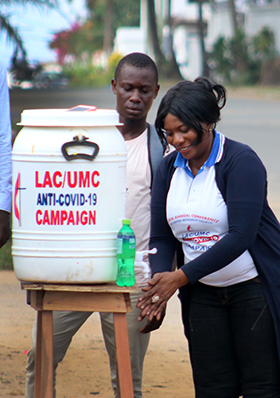
“At Ganta United Methodist Hospital, the isolation ward used during the Ebola crisis is now ready to deal with any coronavirus case,” said Lango W. Toe, director of health for the church in Liberia.
She said Global Ministries is providing $10,000 for the church to implement prevention and control measures at all of the church’s health facilities.
“We have a specific mandate from Global Ministries about the kind of materials to use in training our people in communities where the church health facilities are located,” she said.
Aside from Ganta, the church hospitals do not have ventilators. “When we have a case that requires the use of a ventilator, it will be referred to other hospitals,” Toe said.
With 43 confirmed cases of COVID-19 now recorded in Sierra Leone, United Methodist health facilities have been strengthening infection prevention and control practices.
Ruth and Lowell Gess Eye Hospital has suspended its monthly community outreach program and all but emergency eye operations. The hospital also has set up a triage area to check the vital signs of patients before they enter the facility.
“We have also drastically reduced the number of patients we see for the day to 50 and we make sure that they are not clustered. … For those who do screening of the eyes, which require close contact, they wear special face shields so that in the event a patient coughs, the nurse or doctor is protected,” said staffer Ibrahim Conteh.
The Christian Health Association of Sierra Leone, an umbrella body for Christian health facilities across the country, has supplied materials including personal protective gear to all United Methodist health centers, said Catherine Norman, Sierra Leone Conference’s health coordinator. The health board also is training staff.
United Methodist Mercy Hospital in Bo — which treated Ebola patients and experienced lockdowns during the 2014-16 West Africa outbreak — has set up a triage area and hand-washing stations around the facility and equipped staff with personal protective gear.
“We have increased our surveillance at the outpatient department. Sometimes, the patients don’t disclose their health conditions at the triage, so we monitor to see if they manifest any symptoms of respiratory infections,” said head nurse Hawa Augusta Kpanabom.
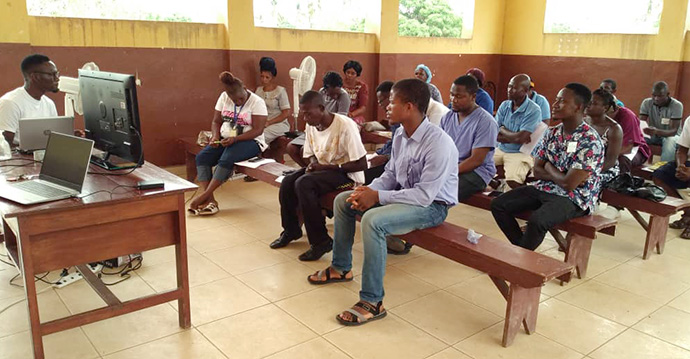
The staff also has put together a nine-minute sensitization video on coronavirus in English and local languages that is now in circulation on social media.
At Kissy United Methodist Hospital, the movement of visitors has been restricted and a triage area that was shuttered after Ebola has been reactivated.
In the Philippines, Mary Johnston Hospital in Manila and Wesleyan University-Philippines Hospital in Cabanatuan City are anchored in Wesleyan spirituality as they treat COVID-19 patients. The Philippines now has over 6,500 cases and 436 deaths.
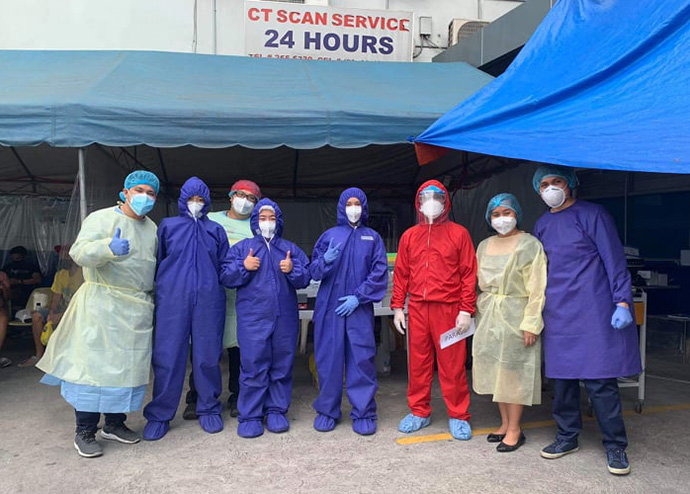
Dr. Glenn Roy V. Paraso, executive director/CEO of Mary Johnston, said that although the hospital was taken by surprise by the outbreak, they have managed to catch up.
“Part of the overall approach to our preparedness is to look at it from a systemic approach of a four health quadrant action strategy that incorporates capacity, information, health financing and sustainability,” he said. “We look at evidence-based scientific procedures to ensure standards and safety procedures for both staff and partner client. It should be patient centered — ensuring their safety and correctness of treatment and diagnosis, but also applies a spiritual/faith-based care and coverage of prayers and empathy as part of the medicines that are being administered.”
Paraso said 180 of its 300-person staff have been dedicated to coronavirus care and trained according to COVID-19 protocols. The hospital has 12 ventilators and another four dedicated for coronavirus patients, he said.
Retired Judge Benjamin D. Turgano, president and CEO of Wesleyan University Hospital, said the outbreak has presented a challenge of unprecedented magnitude, but the facility will continue to lead with compassion.
“The strength of our hospital is not on our physical facilities or equipment, it lies in the sustained level of compassionate hospital care that we continue to render to our patients.”
Turgano said that Wesleyan has four mechanical ventilators and eight cardiac monitors and can accommodate 29 mild to moderate COVID-19 patients.
"Wesleyan University Hospital carefully diagnoses and evaluates the patients at the triage area to properly identify COVID and non-COVID patients,” he said.
“Initially, there were no face masks, face shields and personal protective equipment. Our hospital employees themselves were creative enough to innovate and make their own.”
Paraso said Mary Johnston is grateful for partners, including the United Methodist Board of Global Ministries, who provided much-needed protective gear.
He said the hospital remains focused on healing mind, body and spirit.
“Healing becomes front and center as both staff and patients are healed by the greatest physician himself, bringing hope amidst all this despair, wisdom and knowledge from him to help manage and treat our patients,” he said.
Chikwanah is a communicator for the Zimbabwe East Conference. Communicators E Julu Swen in Liberia, Isaac Broune in Côte d'Ivoire, Chadrack Tambwe Londe in Congo, Gladys P. Mangiduyos in the Philippines, Gad Maiga in Kenya and Phileas Jusu in Sierra Leone contributed to this report.
News media contact: Vicki Brown at (615) 742-5470 or newsdesk@umcom.org. To read more United Methodist news, subscribe to the free Daily or Weekly Digests.
Like what you're reading? Support the ministry of UM News! Your support ensures the latest denominational news, dynamic stories and informative articles will continue to connect our global community. Make a tax-deductible donation at ResourceUMC.org/GiveUMCom.

